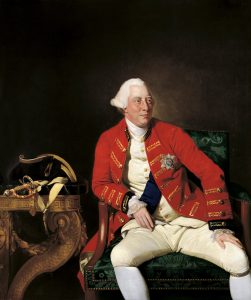Alcibiades, Guy Fawkes, and Benedict Arnold
Alcibiades, Guy Fawkes, and Benedict Arnold were prominent historical figures known for their controversial actions and complex legacies.
Alcibiades:
- Who: An Athenian statesman, orator, and general.
- When: 5th century BC
- What: He was known for his charisma, ambition, and shifting loyalties during the Peloponnesian War. He switched sides between Athens and Sparta, significantly impacting the war’s outcome.
- Legacy: A controversial figure remembered for his military and political talents and perceived treachery.
Guy Fawkes:
- Who: An English Catholic involved in the Gunpowder Plot.
- When: 17th century
- What: Attempted to assassinate King James I and blow up the Houses of Parliament in 1605. The plot was foiled, and Fawkes was executed.
- Legacy: In the UK, his name is associated with treason and terrorism. However, some see him as a symbol of resistance against religious persecution.
Benedict Arnold:
- Who: An American general during the Revolutionary War.
- When: 18th century
- What: Initially a hero of the American Revolution, he later defected to the British side after being disillusioned with the American cause and feeling undervalued.
- Legacy: In the United States, his name is synonymous with treason and betrayal.
Similarities:
- All three were charismatic and influential figures who gained followers and supporters.
- They all engaged in acts of betrayal against their countries or causes.
- A complex mix of personal ambition, political disillusionment, and perceived injustice drove their actions.
- Their legacies continue to be debated and reinterpreted.
Differences:
- Their historical contexts were vastly different.
- Their motivations and specific actions varied considerably.
- Their impact on history and their lasting reputations differ.
I hope this information is helpful. Please let me know if you have any other questions.
Alcibiades History

Alcibiades Being Taught by Socrates, by François-André Vincent (1776) (Wiki Image).
Certainly! Here are ten quotes attributed to or about Alcibiades, the prominent Athenian statesman and general from Ancient Greece:
- “Alcibiades was charming and persuasive beyond all others.” – Plutarch
- “He was a man who knew how to lead, and could make himself beloved by all, even when he chose.” – Thucydides
- “Alcibiades had a marvelous power of persuading his countrymen, and when he wanted to charm, he could be very charming indeed.” – Plato
- “Alcibiades was ambitious, luxurious, and ostentatious, with a taste for the new and the fashionable.” – Diodorus Siculus
- “He lived with all the freedom imaginable, and indulged in all the pleasures of the body without restraint.” – Plutarch
- “Alcibiades had the art of gaining men’s confidence, and of inducing them to adopt his views.” – Plutarch
- “The most handsome and the most courageous, the most eloquent and the most affluent of the Athenians.” – Aristophanes
- “Alcibiades was of an extraordinary beauty and elegance of form, yet not only was his look and carriage engaging in the highest degree, but it was also peculiarly excellent in gaining the affections of all that saw him.” – Plutarch
- “In the field of battle none showed more valor; when necessity demanded, none was more skilled in persuasion.” – Isocrates
- “So changeable was he in his desires, that when he was most ambitious of command, he seemed most indolent; and when it was most for his interest to avoid dangers, he pursued them with the greatest impetuosity.” – Plutarch
These quotes provide various perspectives on Alcibiades, highlighting his charisma, ambition, charm, and complex personality, as ancient historians and contemporaries described.
| Year (approx.) | Age (approx.) | Events & Developments |
|---|---|---|
| 450 BC | 0 | Born in Athens to an aristocratic family. He was orphaned at a young age and raised by his guardian, Pericles (a prominent Athenian statesman). |
| 432 BC | 18 | Begins his political career in Athens. Known for his charm, intelligence, and extravagant lifestyle. |
| 430 BC | 20 | Fights in the Battle of Potidaea during the Peloponnesian War. Saves Socrates’ life in battle. |
| 420s BC | 20s | – Becomes a prominent leader in Athenian politics, advocating for aggressive policies. <br> – Forms an alliance with Argos against Sparta. <br> – Elected strategos (general) several times. |
| 415 BC | 35 | – Proposes and leads the Sicilian Expedition, a disastrous Athenian campaign to conquer Sicily. <br> – Recalled to Athens to face charges of sacrilege (desecrating religious statues). |
| 415 BC | 35 | – Flees to Sparta rather than face trial in Athens. <br> – Advises the Spartans on defeating Athens, contributing to Athenian setbacks. |
| 412 BC | 38 | – Flees to Persia after making enemies in Sparta. <br> – Advises the Persian satrap Tissaphernes, playing a complex diplomatic game. |
| 411 BC | 39 | – Recalled to Athens after a political shift. <br> – Leads the Athenian navy to several victories, restoring his reputation. |
| 407 BC | 43 | – Briefly returns to Athens in triumph but is exiled again after a naval defeat. |
| 404 BC | 46 | – Assassinated in Phrygia (present-day Turkey) under unclear circumstances. |
Alcibiades, the Peloponnesian War, and the Art of Intrigue
(YouTube video
Alcibiades (c. 450–404 BC) was a prominent Athenian statesman, orator, and general. He came from a wealthy and influential family, the Alcmaeonidae, and was a student and friend of Socrates. He was known for his charisma, ambition, intelligence, good looks, controversial actions, and shifting loyalties.
Early Life:
- Born into a wealthy and influential Athenian family, Alcibiades was a ward of Pericles, a prominent Athenian statesman.
- He was a student and friend of Socrates, the renowned philosopher.
- From a young age, Alcibiades displayed a talent for oratory and military leadership.
Peloponnesian War:
- Alcibiades rose to prominence during the Peloponnesian War, a conflict between Athens and Sparta.
- He initially championed an aggressive policy towards Sparta, advocating for the Sicilian Expedition, a disastrous campaign that ultimately weakened Athens.
- Accused of sacrilege, Alcibiades defected to Sparta, where he served as a military advisor.
- Later, he switched sides again, joining the Persian satrap Tissaphernes and eventually returning to Athens.
Return to Athens and Later Life:
- Alcibiades led the Athenian navy to several victories, briefly restoring his popularity in Athens.
- However, his political opponents eventually forced him into exile again.
- He was assassinated in 404 BC, likely by agents of the Spartan government.
Legacy:
- Alcibiades is a complex and controversial figure in history. He is remembered for his brilliance as a military strategist and politician but also for his shifting loyalties, reckless ambition, and questionable ethics.
- His actions had a profound impact on the course of the Peloponnesian War and ultimately contributed to Athens’ defeat.
Historical Significance:
- Alcibiades’ life and career provide a fascinating glimpse into ancient Athens’s political and social dynamics.
- His story is a cautionary tale about the dangers of ambition and the importance of loyalty and integrity.
I hope this summary of Alcibiades’ history is helpful. Please let me know if you have any other questions.
Born into a wealthy and influential Athenian family, Alcibiades was a ward of Pericles, a prominent Athenian statesman. He was a student and friend of Socrates, the renowned philosopher. From a young age, Alcibiades displayed a talent for oratory and military leadership.

Jean-Léon Gérôme: Socrates seeking Alcibiades in the House of Aspasia (1861) (Wiki Image).
Early Life of Alcibiades: A Promising Start
Alcibiades, born circa 450 BC, was a child of privilege, hailing from the esteemed Alcmaeonid family, a lineage deeply embedded in Athenian politics and power. This privileged upbringing afforded him access to the finest education and influential connections that would shape his future.
Following his father’s death in battle, Alcibiades became the ward of Pericles, a towering figure in Athenian democracy. Pericles was a brilliant statesman, renowned orator, and military strategist. Under Pericles’ tutelage, young Alcibiades was exposed to the intricacies of statecraft, the art of persuasion, and the importance of military leadership, laying the foundation for his political and military aspirations.
Alcibiades’ education extended beyond politics and warfare. He also became a student and friend of Socrates, the enigmatic philosopher whose method of inquiry and questioning challenged conventional wisdom. Socrates’ teachings profoundly influenced Alcibiades, fostering his critical thinking, intellectual curiosity, and persuasive abilities.
Even in his youth, Alcibiades possessed a magnetic personality and a natural gift for oratory. He could effortlessly sway crowds with his eloquent speeches and charm, demonstrating a charisma that would later become his hallmark. In addition to his persuasive abilities, Alcibiades displayed a keen aptitude for military strategy and leadership. His courage and tactical brilliance in training exercises foreshadowed his future as a prominent military commander.
Alcibiades’ early life was marked by privilege, mentorship, and the development of exceptional talents. His upbringing and experiences in politics, philosophy, and military training laid the groundwork for his meteoric rise to power in Athens. However, these same qualities would also contribute to his controversial decisions and ultimately lead to his downfall.
Alcibiades rose to prominence during the Peloponnesian War, a conflict between Athens and Sparta. He initially championed an aggressive policy towards Sparta, advocating for the Sicilian Expedition, a disastrous campaign that ultimately weakened Athens.
“Men do not rest content with parrying the attacks of a superior but often strike the first blow to prevent the attack being made. And we cannot fix the exact point at which our empire shall stop; we have reached a position in which we must not be content with retaining but must scheme to extend it, for if we cease to rule others, we are in danger of being ruled ourselves. Nor can you look at inaction from the same point of view as others unless you are prepared to change your habits and make them like theirs.”
Alcibiades’ Oration before the Sicilian expedition, as recorded by Thucydides (VI, 18) (Wiki Image).
Alcibiades’ Rise and the Sicilian Expedition
Alcibiades, a charismatic and ambitious Athenian statesman and general, rose to prominence during the Peloponnesian War (431-404 BC), a devastating conflict that pitted Athens against Sparta. With his exceptional oratory skills, political acumen, and military prowess, Alcibiades quickly became a leading figure in Athenian politics.
Initially, Alcibiades championed an aggressive policy towards Sparta, advocating for a bold expansion of Athenian power. His most notable proposal was the Sicilian Expedition, a massive military campaign aimed at conquering the wealthy city-state of Syracuse on the island of Sicily. Alcibiades envisioned this conquest as a strategic move to weaken Sparta’s allies and solidify Athenian dominance in the region.
Despite warnings from cautious voices, Alcibiades’ persuasive rhetoric and promises of glory swayed the Athenian assembly to approve the expedition. In 415 BC, a massive Athenian fleet led by Alcibiades, Nicias, and Lamachus set sail for Sicily. However, the expedition quickly turned into a disaster.
The Athenians faced fierce resistance from the Syracusans, who were aided by their Spartan allies. Logistical challenges, internal conflicts among the Athenian commanders, and the arrival of the Spartan general Gylippus further compounded the situation. The Athenian forces were decisively defeated after many costly battles and sieges.
The Sicilian Expedition resulted in the loss of thousands of Athenian lives and a significant portion of their fleet. This catastrophic failure severely weakened Athens and marked a turning point in the Peloponnesian War, shifting the balance of power in favor of Sparta.
Historians debate Alcibiades’ role in the Sicilian Expedition. While his ambition and strategic vision initially fueled the campaign, his leadership was marred by recklessness, arrogance, and a disregard for the risks involved. His advocacy for this ill-fated expedition ultimately contributed to Athens’ downfall and solidified his controversial legacy in history.
Accused of blasphemy, Alcibiades defected to Sparta, where he served as a military advisor. Later, he switched sides again, joining the Persian satrap Tissaphernes and eventually returning to Athens.
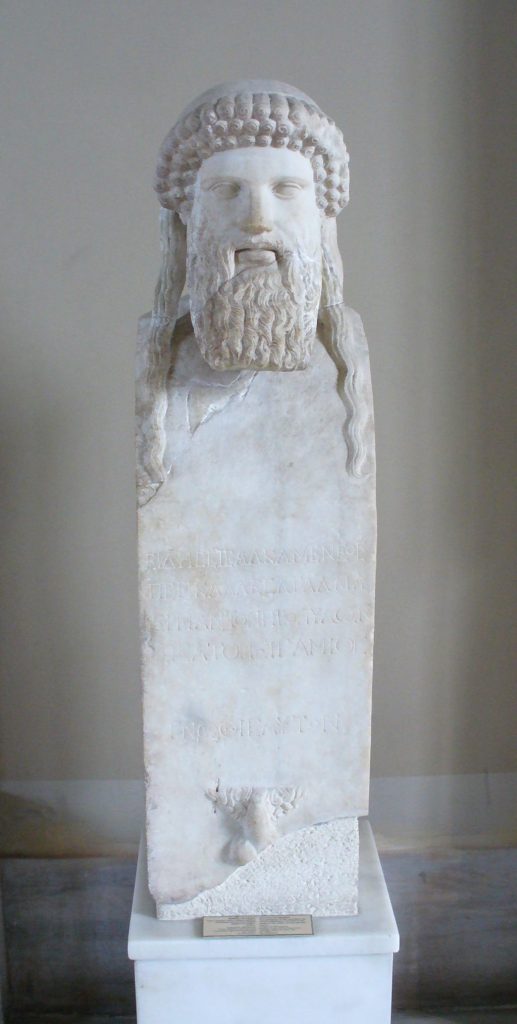
Roman copy of a late fifth-century BC Athenian herma. Vandalizing hermai was one of the crimes of which Alcibiades was accused (Wiki Image).
Alcibiades’ Shifting Allegiances: A Tale of Betrayal and Opportunism
In 415 BC, before the Athenian fleet departed for Sicily, Alcibiades was accused of blasphemy for allegedly mutilating statues of the god Hermes. Fearing political persecution and a potential death sentence, he defected to Sparta, Athens’ arch-rival in the Peloponnesian War. This betrayal shocked the Athenians and further tarnished his already controversial reputation.
Alcibiades advised the Spartans, using his knowledge of Athenian military strategies and tactics in Sparta, helping them gain an advantage in the war. He played a crucial role in several Spartan victories, including capturing the Athenian base at Decelea, significantly weakening Athens’ position.
However, Alcibiades’ stay in Sparta was short-lived. Due to his arrogance and his affair with the wife of King Agis II, he soon made enemies among the Spartan elite. Fearing for his safety, he fled to Persia, seeking refuge with the satrap Tissaphernes.
In Persia, Alcibiades continued his intrigues, playing both sides against each other. He encouraged Tissaphernes to support the Peloponnesian League while simultaneously maintaining contact with Athenian factions loyal to him. In 411 BC, he returned to Athens, briefly reinstated as a general, and led the Athenian fleet to several victories.
However, Alcibiades’ return to power was short-lived. After a defeat at the Battle of Notium, he was once again exiled. He sought refuge in Thrace and Phrygia, where he was assassinated in 404 BC.
Alcibiades’ shifting allegiances and opportunistic behavior throughout the Peloponnesian War cemented his reputation as a cunning and unreliable figure. While his military and political talents were undeniable, his loyalty to Athens was always secondary to his ambition and self-preservation. His story is a cautionary tale about the dangers of unchecked ambition and the importance of loyalty and integrity in leadership.
Alcibiades led the Athenian navy to several victories, briefly restoring his popularity in Athens. However, his political opponents eventually forced him into exile again. He was assassinated in 404 BC, likely by agents of the Spartan government.
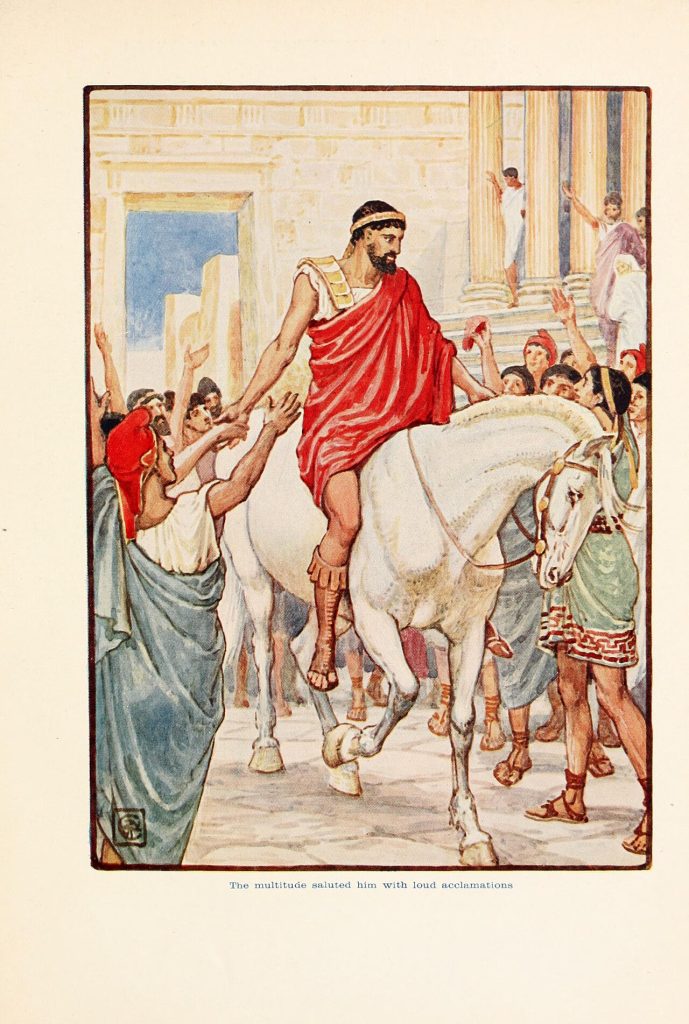
Alcibiades returns triumphantly to Athens; illustration from a 1910s history textbook (Wiki Image).
Absolutely! Here’s a slightly expanded look at Alcibiades’ triumphant return, subsequent exile, and eventual assassination, incorporating your points and adding a bit more context:
Alcibiades’ Brief Return to Glory:
Despite his controversial past and history of betrayal, Alcibiades orchestrated a remarkable return to Athens in 411 BC. He recognized his strategic brilliance and the Athenian fleet’s need for strong leadership, so he persuaded them to recall him from exile. Once reinstated as a general, Alcibiades quickly proved his worth by leading the Athenian navy to a series of stunning victories against the Spartans.
His tactical acumen and charismatic leadership were instrumental in recapturing several key territories, including Byzantium and Chalcedon. These successes bolstered Athenian morale and briefly restored Alcibiades’ popularity among the people, who once again saw him as a potential savior for their beleaguered city-state.
Political Intrigue and Second Exile:
However, Alcibiades’ triumph was short-lived. His political opponents, who never fully trusted him due to his history of switching sides, continued to undermine his authority. After a minor naval defeat at Notium in 407 BC, they seized the opportunity to remove him from command. Blamed for the loss, Alcibiades was again ostracized and forced into exile.
Assassination in Phrygia:
This time, his exile was permanent. Alcibiades sought refuge in Thrace and later in Phrygia under the protection of the Persian satrap Pharnabazus. However, his enemies in Sparta and Athens remained relentless. In 404 BC, Alcibiades was assassinated in Phrygia. While the exact circumstances of his death remain unclear, it is widely believed that agents of the Spartan government or their allies were responsible, fearing his potential return to power and the threat he posed to their interests.
A Tragic End to a Complex Legacy:
Alcibiades’ assassination marked a tragic end to a life filled with both triumphs and controversies. While he possessed undeniable military and political talent, his ambition, arrogance, and shifting loyalties ultimately led to his downfall. His story serves as a stark reminder of the complexities of human nature and the dangers of unchecked ambition in the pursuit of power.
Alcibiades is a complex and controversial figure in history. He is remembered for his brilliance as a military strategist and politician but also for his shifting loyalties, reckless ambition, and questionable ethics. His actions had a profound impact on the course of the Peloponnesian War and ultimately contributed to Athens’ defeat.

Timeline of Alcibiades’ life (c. 450–404 BC) (Wiki Image).
Absolutely! Alcibiades’ legacy is indeed complex and multi-faceted. He was undoubtedly a brilliant figure, possessing a unique blend of charisma, intellect, and military prowess, making him a force to be reckoned with in ancient Athens. However, his ambition, impulsive nature, and questionable moral compass ultimately led him down a path of betrayal and contributed to his city-state’s downfall.
A Brilliant but Flawed Strategist:
Alcibiades was a gifted military leader and strategist. His bold tactics and innovative approaches often led to stunning victories for Athens. His understanding of the political landscape and ability to manipulate events to his advantage were equally impressive.
A Charismatic Leader:
Alcibiades’ charisma and charm were legendary. His eloquence and persuasive abilities effortlessly captivated audiences. He was a master of manipulating public opinion and garnering support for his ambitious plans.
A Controversial Figure:
Despite his undeniable talents, Alcibiades was also a deeply flawed individual. His ambition knew no bounds, and he was willing to sacrifice loyalty and principles to achieve his goals. His shifting allegiances during the Peloponnesian War, betraying Athens and Sparta at different times, earned him a reputation for treachery and opportunism.
Impact on the Peloponnesian War:
Alcibiades’ actions had a profound and lasting impact on the course of the Peloponnesian War. His aggressive policies and advocacy for the Sicilian Expedition led to a disastrous defeat for Athens, weakening the city-state and ultimately contributing to its loss in the war. His subsequent defections to Sparta and Persia further damaged Athenian morale and undermined its war effort.
A Legacy of Debate:
Alcibiades’ legacy continues to be debated among historians and scholars. Some see him as a tragic hero, a brilliant figure whose flaws ultimately led to his downfall. Others view him as a cunning opportunist who betrayed his city and contributed to its demise.
Regardless of one’s interpretation, Alcibiades’ story is a cautionary tale about the dangers of unchecked ambition, the importance of loyalty and integrity, and the potential consequences of prioritizing personal gain over the greater good.
Alcibiades’ life and career provide a fascinating glimpse into ancient Athens’s political and social dynamics. His story is a cautionary tale about the dangers of ambition and the importance of loyalty and integrity.
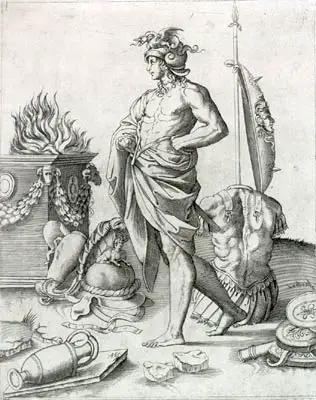
An engraving by Agostino Veneziano reflects a Renaissance view of Alcibiades (Wiki Image).
Absolutely! Alcibiades’ life is a captivating yet cautionary tale that offers valuable insights into ancient Athens’s political, social, and military landscape.
A Glimpse into Athenian Society:
- Power and Influence: Alcibiades’ story highlights the role of wealth, family connections, and personal charisma in attaining power and influence in Athenian society. His ability to navigate the complex political landscape and manipulate public opinion demonstrates the importance of rhetoric and persuasion in democratic Athens.
- Social Mobility: Despite his aristocratic background, Alcibiades’ life demonstrates the potential for social mobility in Athenian society. His rise to prominence was based on his talents and abilities, showcasing the opportunities for individuals to achieve success through merit.
- The Role of the Military: Alcibiades’ military career highlights the importance of military leadership and strategy in Athenian society. His successes and failures on the battlefield reveal the risks and rewards associated with warfare and its impact on political and social dynamics.
A Cautionary Tale:
- Ambition and Betrayal: Alcibiades’ relentless ambition and willingness to betray his city-state for personal gain serve as a cautionary tale about the dangers of unchecked ambition. His actions ultimately led to his downfall and contributed to Athens’ defeat in the Peloponnesian War.
- Loyalty and Integrity: Alcibiades’ shifting loyalties and opportunistic behavior highlight the importance of loyalty and integrity in leadership. His lack of commitment to Athens and his willingness to serve its enemies ultimately eroded his credibility and undermined his authority.
Lessons for Today:
- The Importance of Values: Alcibiades’ story reminds us of upholding loyalty, integrity, and commitment to the greater good. While ambition and talent are valuable assets, they must be tempered by ethical considerations.
- The Dangers of Power: Alcibiades’ life warns about the corrupting influence of power and its potential misuse for personal gain. It underscores the importance of checks and balances in any system of governance.
- The Complexity of Human Nature: Alcibiades’ story reveals the multifaceted nature of human beings, capable of both great achievements and profound flaws. His life reminds us that even the most brilliant and charismatic individuals can be driven by ambition and self-interest.
In conclusion, Alcibiades’ life and career offer a fascinating glimpse into the complexities of ancient Athenian society and the timeless challenges of leadership, ambition, and ethical decision-making. His story is a valuable lesson for individuals and institutions, reminding us of balancing personal ambition with loyalty, integrity, and a commitment to the greater good.
Guy Fawkes History

George Cruikshank‘s illustration of Guy Fawkes was published in William Harrison Ainsworth‘s 1840 novel Guy Fawkes (Wiki Image).
Certainly! Here are ten quotes attributed to or about Guy Fawkes, the English Catholic conspirator involved in the Gunpowder Plot of 1605:
- “Remember, remember, the Fifth of November, the Gunpowder Treason and Plot. I know of no reason why the Gunpowder Treason should ever be forgot.” – Traditional Rhyme
- “A desperate disease requires a dangerous remedy.” – Guy Fawkes
- “The purpose of the Gunpowder Plot was to blow up the English Parliament and King James I.” – Historical Context
- “It is impossible to go beyond that, and we do not seek to lessen the crime of which Fawkes was guilty, but his name is famous, not because he tried to kill the King, but because he failed.” – Lord Macaulay.
- “The last man to enter Parliament with honest intentions.” – Anonymous Saying
- “I see that we must die, and it is now time to do it.” – Guy Fawkes, upon the plot’s discovery.
- “A traitor to his king and country.” – King James I, on Guy Fawkes
- “A man that could neither be bent nor broken.” – Description of Guy Fawkes by his contemporaries
- “To blow you Scotch beggars back to your native mountains.” – Guy Fawkes, referring to the reason for the Gunpowder Plot against King James I and his Scottish court
- “If I had undertaken this business, I would have planted the powder underground and blown it up that way.” – Guy Fawkes, explaining how he would have improved the plot’s execution
These quotes provide insight into the motives, perceptions, and legacy of Guy Fawkes, illustrating his role in the infamous Gunpowder Plot and his enduring place in history and popular culture.
| Year | Age | Events & Developments |
|---|---|---|
| 1570 | 0 | Born in York, England (April 13th, baptized). |
| 1578 | 8 | His father dies. His mother remarries a Catholic recusant (someone who refused to attend Church of England services). |
| 1580s | 10s | Attends St. Peter’s School in York. Exposed to both Protestant and Catholic influences. |
| 1591 | 21 | Sells his father’s estate. Travels to mainland Europe. |
| 1593 | 23 | Joins the Spanish army in the Netherlands, fighting against the Dutch in the Eighty Years’ War. Adopts the Italian version of his name, “Guido Fawkes.” |
| 1596 | 26 | Participates in the Siege of Calais. |
| 1603 | 33 | He travels to Spain to seek support for a Catholic uprising in England but is unsuccessful. |
| 1604 | 34 | Returns to England and becomes involved in the Gunpowder Plot, a conspiracy to assassinate King James I and blow up the Houses of Parliament. |
| 1605 | 35 | – May: The plotters lease a cellar under the House of Lords. Fawkes is placed in charge of the gunpowder. <br> – November 5th (early morning): Fawkes is discovered guarding the gunpowder and arrested. |
| 1605 | 35 | – November 6th – 8th: Fawkes is interrogated and tortured in the Tower of London. He reveals the names of his co-conspirators. |
| 1606 | 35 | – January 27th: Fawkes is tried and found guilty of high treason. <br> – January 31st: Fawkes is executed in the Old Palace Yard at Westminster. He avoids the full horrors of being hanged, drawn, and quartered by jumping from the scaffold and breaking his neck. |
The Twisted Story of the Real Guy Fawkes
(YouTube video)
Guy Fawkes (13 April 1570 – 31 January 1606) was an English Catholic known for his involvement in the Gunpowder Plot of 1605, a failed conspiracy to assassinate King James I and blow up the Houses of Parliament.
Early Life:
- Born: April 13, 1570, in York, England.
- Religious Background: Born into a Protestant family, Fawkes converted to Catholicism following his father’s death and his mother’s remarriage to a Catholic.
Military Career:
- Service: Fawkes served as a soldier in the Spanish army in the Netherlands during the Eighty Years’ War, fighting against Protestant Dutch reformers. He gained significant military experience and adopted the name “Guido.”
The Gunpowder Plot:
- Background: The Gunpowder Plot was conceived in response to the continued persecution of Catholics under King James I of England.
- Conspirators: Led by Robert Catesby, the plot involved a group of English Catholics, including Fawkes, Thomas Wintour, Robert Wintour, John Wright, Christopher Wright, Thomas Percy, and others.
- Plan: The conspirators planned to blow up the House of Lords during the State Opening of Parliament on November 5, 1605, intending to kill King James I and the Protestant elite. They hoped to incite a Catholic uprising and restore a Catholic monarchy.
Role in the Plot:
- Explosives Expert: Due to his military background, Fawkes was in charge of the gunpowder stored in a cellar beneath the House of Lords.
- Capture: On the night of November 4-5, 1605, Fawkes was discovered guarding the explosives. He was arrested, and the plot was foiled.
Interrogation and Execution:
- Torture: Fawkes was tortured to reveal the names of his co-conspirators.
- Trial: He was tried and found guilty of high treason.
- Execution: On January 31, 1606, Fawkes was executed by hanging, drawing, and quartering, a common punishment for traitors in that era.
Legacy:
- Guy Fawkes Night: Also known as Bonfire Night, it is celebrated annually on November 5th in the United Kingdom. The event includes fireworks, bonfires, and the burning of effigies of Guy Fawkes, commemorating the plot’s failure.
- Cultural Impact: Fawkes has become a symbol of resistance against government oppression. His image is notably used in the “V for Vendetta” graphic novel and film, and the Guy Fawkes mask has been adopted by various protest movements worldwide.
Controversial Figure:
- Fawkes remains a controversial figure. Some view him as a religious extremist and terrorist, while others consider him a symbol of resistance against religious persecution.
- His story has been the subject of numerous films, books, and historical interpretations.
Guy Fawkes’ legacy endures as a complex figure: a traitor who sought to restore religious freedom for Catholics in England, his actions have left an indelible mark on British culture and collective memory.
Born: April 13, 1570, in York, England. Religious Background: Born into a Protestant family, Guy Fawkes converted to Catholicism following his father’s death and his mother’s remarriage to a Catholic. Service: Fawkes served as a soldier in the Spanish army in the Netherlands during the Eighty Years’ War, fighting against Protestant Dutch reformers. He gained significant military experience and adopted the name “Guido.”

Fawkes was baptized on 16 April 1570 at St Michael le Belfrey, York, next to York Minster (seen at left) (Wiki Image).
Born: April 13, 1570, in York, England
Religious Conversion: Fawkes was raised in a Protestant family but converted to Catholicism after his father’s death when his mother remarried a devout Catholic. This change in faith profoundly influenced his beliefs and ultimately led to his involvement in the Gunpowder Plot.
Military Career: At age 21, Fawkes traveled to mainland Europe and enlisted in the Spanish army. He fought in the Eighty Years’ War, a conflict between Spain and Dutch rebels seeking independence from Spanish rule. During his service, Fawkes gained valuable military experience and expertise in explosives, adopting the Italianized name “Guido.”
Key Points:
- Fawkes’ religious conversion from Protestantism to Catholicism was a pivotal moment in his life, shaping his beliefs and motivations.
- His military service in the Spanish army provided him with valuable combat experience and knowledge of explosives, which would later be instrumental in the Gunpowder Plot.
- Adopting “Guido” reflects his immersion in Catholic culture and commitment to the Catholic cause.
These early experiences in Fawkes’ life laid the groundwork for his involvement in the Gunpowder Plot, a failed attempt to overthrow the Protestant government and restore Catholicism in England.
Background: The Gunpowder Plot was conceived in response to the continued persecution of Catholics under King James I of England. Conspirators: Led by Robert Catesby, the plot involved a group of English Catholics, including Fawkes, Thomas Wintour, Robert Wintour, John Wright, Christopher Wright, Thomas Percy, and others. Plan: The conspirators planned to blow up the House of Lords during the State Opening of Parliament on November 5, 1605, intending to kill King James I and the Protestant elite. They hoped to incite a Catholic uprising and restore a Catholic monarchy.

This is a contemporary engraving by Crispijn van de Passe of eight of the thirteen conspirators. Fawkes is third from the right (Wiki Image).
Absolutely! Let’s delve deeper into the Gunpowder Plot and the motivations behind it:
The Gunpowder Plot: A Desperate Act of Rebellion
Background:
The Gunpowder Plot was a desperate attempt by a group of English Catholics to overthrow the Protestant monarchy and end the persecution they faced under King James I. Catholics had hoped that James, whose mother was Catholic, would be more tolerant than Queen Elizabeth I. However, James maintained a strict anti-Catholic policy, leading to frustration and resentment among the Catholic community.
Conspirators:
The plot was masterminded by Robert Catesby, a devout Catholic who had grown disillusioned with the political situation. He recruited a small group of like-minded individuals, including:
- Guy Fawkes: A veteran soldier with expertise in explosives, tasked with guarding the gunpowder stored beneath Parliament.
- Thomas Wintour: A wealthy landowner who provided financial support and connections.
- Robert Wintour: Thomas’s brother, who helped with logistics and planning.
- John Wright: A skilled swordsman and trusted confidant of Catesby.
- Christopher Wright: John’s brother, who also joined the conspiracy.
- Thomas Percy: A relative of the Earl of Northumberland who provided access to properties near Parliament.
The Plan:
The conspirators’ audacious plan involved renting a cellar beneath the House of Lords and filling it with 36 barrels of gunpowder. Fawkes was tasked with igniting the explosives during the State Opening of Parliament when the King, Queen, and members of Parliament would be present. The plotters hoped the explosion would kill the Protestant elite and spark a nationwide Catholic uprising, leading to the restoration of a Catholic monarch.
Discovery and Aftermath:
The plot was ultimately foiled by an anonymous letter sent to Lord Monteagle, warning him to stay away from Parliament. The authorities searched the building and found Fawkes guarding the gunpowder. He was arrested, tortured, and eventually executed along with several other conspirators.
Legacy:
The Gunpowder Plot had a profound impact on English history. It intensified anti-Catholic sentiment and led to further repression of Catholics. However, it also served as a stark reminder of the dangers of religious extremism and the lengths to which people will go to defend their beliefs.
Today, Guy Fawkes Night is celebrated annually in the UK on November 5th, commemorating the foiled plot and serving as a reminder of the importance of tolerance and religious freedom.
Explosives Expert: Due to his military background, Fawkes was in charge of the gunpowder stored in a cellar beneath the House of Lords. Capture: On the night of November 4-5, 1605, Fawkes was discovered guarding the explosives. He was arrested, and the plot was foiled.

Discovery of the Gunpowder Plot (c. 1823), by Henry Perronet Briggs (Wiki Image).
Guy Fawkes: The Explosives Expert
-
-
Explosives Expertise: Due to his military background and experience in the Spanish army during the Eighty Years’ War, Guy Fawkes was entrusted with the most crucial aspect of the Gunpowder Plot: handling and guarding the explosives. His knowledge of gunpowder and its destructive potential made him an ideal candidate for this dangerous task.
-
The Cellar Beneath Parliament: Fawkes meticulously prepared the cellar beneath the House of Lords, carefully positioning 36 gunpowder barrels to maximize the planned explosion’s impact. He remained hidden in the basement, awaiting the opportunity to ignite the explosives and carry out the plot.
-
Discovery and Capture: On the eve of the State Opening of Parliament, authorities received an anonymous tip-off warning of the plot. Searching the premises led to the discovery of Fawkes in the cellar, guarding the gunpowder. He was immediately arrested, and the Gunpowder Plot was thwarted.
-
The Aftermath: Fawkes was subjected to brutal torture in the Tower of London, where he eventually confessed his involvement and the names of his co-conspirators. He was sentenced to death by hanging, drawing, and quartering, a gruesome punishment reserved for traitors. However, Fawkes cheated the executioner by jumping from the gallows and breaking his neck before the full sentence could be carried out.
His capture and the subsequent foiling of the Gunpowder Plot marked a significant event in English history. It not only saved the life of King James I and the Protestant elite but also intensified anti-Catholic sentiment in England, leading to further persecution of Catholics.
Torture: Fawkes was tortured to reveal the names of his co-conspirators. Trial: He was tried and found guilty of high treason. Execution: On January 31, 1606, Fawkes was executed by hanging, drawing, and quartering, a common punishment for traitors in that era.

Fawkes’s signature of “Guido,” made soon after his torture, is a barely evident scrawl compared to a later instance eight days after the torture (Wiki Image).

A 1606 etching by Claes (Nicolaes) Jansz Visscher depicting Fawkes’s public execution in Westminster (Wiki Image).
The Grim Fate of Guy Fawkes: Torture, Trial, and Execution
Torture:
Following his arrest, Guy Fawkes was imprisoned in the Tower of London and subjected to brutal torture. The authorities were desperate to extract information about his co-conspirators and the extent of the plot. He was subjected to sleep deprivation, the rack, and other agonizing methods in an attempt to break his will and force him to confess. After enduring immense pain, Fawkes eventually revealed the names of his fellow plotters.
Trial:
Fawkes and his surviving co-conspirators were tried for high treason. The evidence against them was overwhelming, and they were swiftly found guilty. The trial served as a public spectacle, highlighting the government’s determination to punish the traitors and discourage future acts of rebellion.
Execution:
On January 31, 1606, Guy Fawkes and several other conspirators were taken to the Old Palace Yard at Westminster for their execution. They were sentenced to be hanged, drawn, and quartered, a gruesome punishment reserved for traitors.
This horrific execution involved hanging the condemned until near death, then disemboweling them while still alive, and finally, beheading and quartering their bodies. Fawkes, however, managed to avoid the full extent of this torture by jumping from the gallows and breaking his neck before the disembowelment could take place.
Legacy:
Despite his brutal end, Guy Fawkes’ name and image have endured in popular culture. Though condemned as treasonous, his actions have also been interpreted to symbolize resistance against oppression. His story continues to be a source of fascination and debate, reminding us of history’s complex and often violent nature of political and religious conflict.
Guy Fawkes Night: Also known as Bonfire Night, it is celebrated annually on November 5th in the United Kingdom. The event includes fireworks, bonfires, and the burning of effigies of Guy Fawkes, commemorating the plot’s failure. Cultural Impact: Fawkes has become a symbol of resistance against government oppression. His image is notably used in the “V for Vendetta” graphic novel and film, and the Guy Fawkes mask has been adopted by various protest movements worldwide.
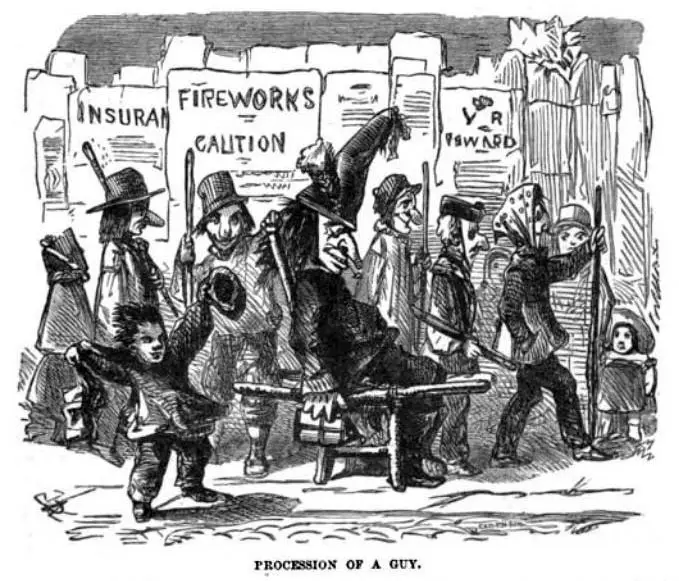
Procession of a Guy (1864) (Wiki Image).
Absolutely! Here’s a slightly expanded look at the legacy of Guy Fawkes Night and its cultural impact:
Guy Fawkes Night: A Celebration of History and Resistance
Also known as Bonfire Night, this annual event is celebrated on November 5th across the United Kingdom to commemorate the failed Gunpowder Plot of 1605. The night is marked by:
- Bonfires: Symbolically burning effigies of Guy Fawkes, the most infamous plotter.
- Fireworks: Dazzling displays that light up the sky.
- Celebrations: Community gatherings and festivities.
The original intent was to celebrate the survival of King James I and the Protestant establishment, but the meaning has evolved.
Cultural Impact: From Traitor to Symbol of Resistance
While Fawkes was initially vilified as a traitor, his image has been reclaimed as a symbol of resistance against perceived tyranny and oppression in modern times.
- V for Vendetta: The graphic novel and film adaptation popularized the Guy Fawkes mask, turning it into an emblem of anti-establishment sentiment.
- Global Protest Movements: The mask has been adopted by diverse groups worldwide, including Anonymous, Occupy Wall Street, and various pro-democracy movements, symbolizing the fight against corruption and perceived injustice.
The Mask’s Appeal:
- Anonymity: The mask allows protesters to shield their identities and unite under a common symbol.
- Historical Resonance: It evokes the spirit of rebellion against authority, resonating with those who feel marginalized or oppressed.
- Visual Impact: The mask’s stark design and striking features make it instantly recognizable and visually powerful.
Legacy of Guy Fawkes Night:
While Bonfire Night remains a fun and festive occasion for many, its enduring legacy is complex. It serves as a reminder of historical events while fueling contemporary discussions about the nature of protest, civil disobedience, and the ongoing struggle for freedom and justice.
Guy Fawkes remains a controversial figure. Some view him as a religious extremist and terrorist, while others consider him a symbol of resistance against religious persecution. His story has been the subject of numerous films, books, and historical interpretations.

Children prepare for Guy Fawkes night celebrations (1954) (Wiki Image).
Absolutely! Guy Fawkes’s legacy is complex, and interpretations vary greatly depending on one’s perspective and values.
The Terrorist Interpretation:
- Many see Guy Fawkes as a terrorist due to his participation in the Gunpowder Plot, a conspiracy to assassinate the King and blow up Parliament. This act, aimed at causing mass casualties and political upheaval, is often condemned as an act of extremism and violence.
- Fawkes’ willingness to use extreme violence for religious and political goals aligns with the modern definition of terrorism.
The Freedom Fighter Interpretation:
- Others view Guy Fawkes as a symbol of resistance against oppression. For many Catholics in 17th-century England, the Protestant monarchy represented religious persecution and discrimination. Fawkes and his co-conspirators saw themselves as fighting for their faith and freedom.
- In this context, some interpret the Gunpowder Plot as an act of desperation against an unjust regime, highlighting the importance of fighting for one’s beliefs.
The Complex Legacy:
- In reality, Guy Fawkes’ motives were likely a combination of religious zeal, political dissatisfaction, and personal ambition. He was a product of his time, shaped by the religious and political conflicts of 17th-century England.
- It is essential to consider the historical context and avoid judging him solely through a modern lens. However, it is also crucial to acknowledge the violence he was willing to inflict and the potential consequences of his actions.
Guy Fawkes in Popular Culture:
- The controversy surrounding Guy Fawkes has made him a fascinating and enduring figure in popular culture.
- He has been portrayed in numerous films, books, and television shows, often with conflicting interpretations.
- Based on his likeness, the Guy Fawkes mask symbolizes protest and resistance in various movements worldwide.
The story of Guy Fawkes reminds us of the complexities of history and the importance of understanding the motivations and context of historical figures. His legacy continues to spark debate and raise questions about the nature of rebellion, terrorism, and the struggle for freedom.
Benedict Arnold History
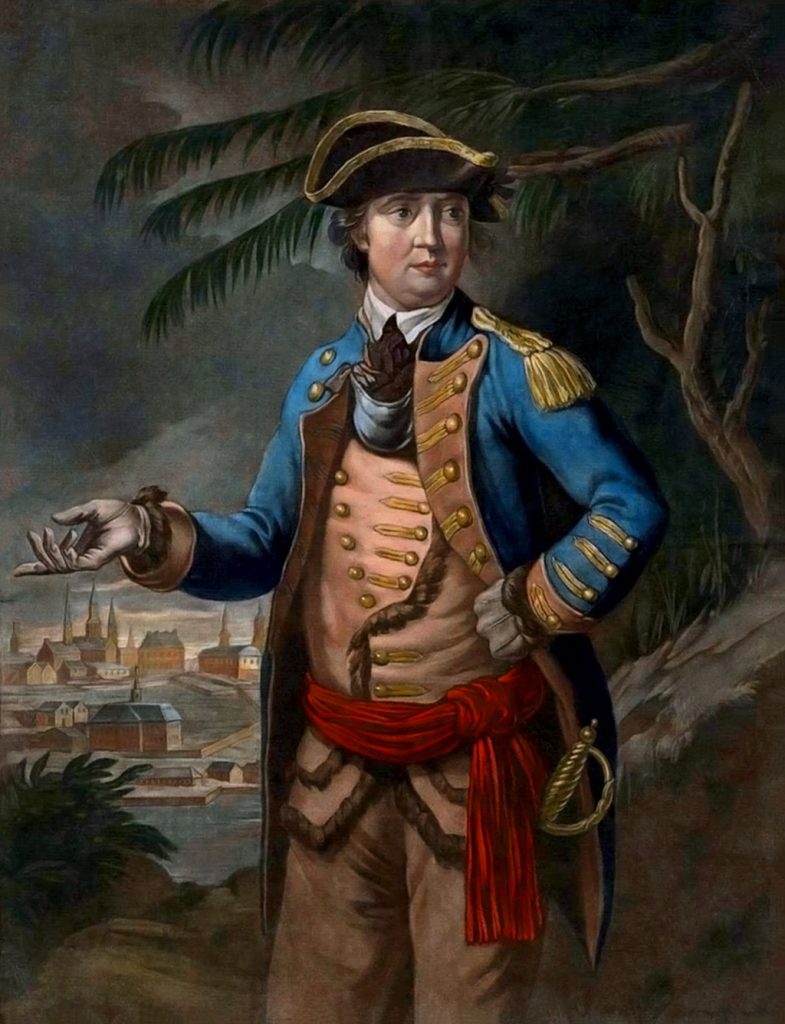
Portrait of Arnold in 1776 (Wiki Image).
Here are 10 quotes attributed to Benedict Arnold, showcasing his ambition, frustration, and, ultimately, betrayal:
- “Let me fight as I will, and I will whip them.” (Reflecting his confidence and aggressiveness as a military leader)
- “None but a fool will bring up his artillery before his infantry is engaged.” (Demonstrating his tactical acumen and understanding of military strategy)
- “I am in the midst of thousands, and not a soul who cares for me.” (Expressing his feelings of isolation and lack of appreciation)
- “Money is this man’s God, and to get enough of it, he would sacrifice his country.” (A statement by one of his detractors, reflecting the accusations of greed leveled against him)
- “The heart that is conscious of its own rectitude cannot attempt to palliate a step which the world may censure.” (Arnold’s defense of his actions in a letter to George Washington)
- “I beg leave to observe that I have ever been of the opinion that the true interest of America would be served by an alliance with Great Britain.” (Revealing his shifting allegiance and belief in reconciliation with Britain)
- “What makes this man a traitor? A consciousness of having acted wrong.” (A quote from a letter by Arnold, attempting to justify his actions)
- “Ingratitude is the unpardonable sin.” (Expressing his resentment towards the Continental Congress and military leaders who he felt had wronged him)
- “I have done all I can to prevent the effusion of blood.” (Arnold’s claim of wanting to avoid further bloodshed by negotiating with the British)
- “My life is at the disposal of my country, but my honor is my own.” (A defiant statement reflecting Arnold’s belief that his actions were justified despite the accusations of treason)
These quotes offer a glimpse into Benedict Arnold’s complex and contradictory nature, highlighting his military prowess, personal grievances, and descent into betrayal. While he is remembered primarily as a traitor in American history, his words provide a deeper understanding of his motivations and the personal struggles that led him to his fateful decision.
| Year | Age | Events & Developments |
|---|---|---|
| 1741 | 0 | Born in Norwich, Connecticut (January 14th). |
| 1757 | 16 | Apprenticed to an apothecary (pharmacist). |
| 1762 | 21 | Establishes his apothecary and bookstore. |
| 1767 | 26 | Marries Margaret Mansfield. They have three sons. |
| 1775 | 34 | – Begins his military career in the Connecticut militia after the Battles of Lexington and Concord. <br> – Leads the capture of Fort Ticonderoga. |
| 1775 | 34 | – Leads a daring expedition through the wilderness of Maine to Quebec. <br> – Participates in the unsuccessful attack on Quebec City, where he is wounded in the leg. |
| 1776 | 35 | – Commands the American fleet on Lake Champlain, delaying a British advance. |
| 1777 | 36 | – Plays a crucial role in the American victory at the Battle of Saratoga, a turning point in the Revolutionary War. <br> – Promoted to Major General. |
| 1778 | 37 | – Given command of Philadelphia. <br> – Marries Peggy Shippen, the daughter of a Loyalist. <br> – Begins to express grievances about lack of recognition and financial difficulties. |
| 1779 | 38 | – Engages in secret correspondence with British Major John André. <br> – Plots to surrender West Point to the British in exchange for money and a command in the British army. |
| 1780 | 39 | – His plot is exposed when André is captured with incriminating documents. <br> – Flees to British lines and becomes a Brigadier General in the British army. |
| 1781 | 40 | – Led British raids in Virginia and Connecticut. |
| 1781 | 40 | – Moves to London with his family after the end of the Revolutionary War. |
| 1801 | 60 | – Dies in London (June 14th), largely unmourned and disgraced. |
Benedict Arnold: The Revolutionary War in Four Minutes
(YouTube video)
Certainly! Here’s an overview of Benedict Arnold and his historical significance:
Benedict Arnold: A Historical Overview
Early Life:
- Born: January 14, 1741, in Norwich, Connecticut.
- Family: The Arnold family faced financial difficulties and hardships, and the loss of siblings to disease marked Benedict’s early life.
Military Career:
- Early Service: Arnold served in the militia during the French and Indian War and became a successful merchant.
- American Revolutionary War:
- Early Contributions: Arnold joined the Continental Army at the outbreak of the American Revolutionary War. He was crucial in capturing Fort Ticonderoga in 1775 alongside Ethan Allen.
- Canadian Campaign: Led a grueling expedition through the Maine wilderness in an unsuccessful attempt to capture Quebec in late 1775.
- Valcour Island: Commanded a fleet in the Battle of Valcour Island in 1776, which, despite being a tactical defeat, delayed the British advance and showcased Arnold’s naval leadership.
- Saratoga: Arnold’s leadership was pivotal in the 1777 Battles of Saratoga, contributing significantly to the American victory, often considered the war’s turning point. However, he was severely wounded in the leg during the battle.
Defection:
- Motivations: Despite his contributions, Arnold felt unappreciated and overlooked for promotions. He also faced financial troubles and was accused of corruption.
- West Point: In 1780, Arnold was appointed commander of the American fortifications at West Point, New York. He secretly negotiated with the British to surrender the fort for money and a position in the British Army.
- Discovery: The plot was discovered when Major John André, the British officer involved in the negotiations, was captured with incriminating documents. Arnold escaped to British lines just in time to avoid arrest.
Later Life:
- British Army: Arnold served as a brigadier general in the British Army, leading raids in Virginia and Connecticut, but he never fully gained the trust of his British peers.
- Post-War: After the war, Arnold moved to London. He attempted various business ventures but faced financial difficulties and a lack of public trust.
- Death: Arnold died on June 14, 1801, in London, primarily shunned and living in relative obscurity.
Legacy:
- Infamy: Benedict Arnold’s name became synonymous with treason in the United States. He is often remembered as the quintessential traitor, with his actions serving as a cautionary tale of betrayal.
- Complex Figure: Despite his treason, Arnold’s early contributions to the American cause were significant, and some historians view his later actions as a tragic consequence of personal grievances and perceived injustices.
- Cultural Depictions: Arnold’s story has been depicted in numerous books, films, and TV shows, emphasizing both his heroism and his ultimate betrayal.
Benedict Arnold’s legacy is complex, marked by his early heroism and significant contributions to the American Revolutionary War, overshadowed by his later act of treason. His life serves as a reminder of the thin line between heroism and betrayal, influenced by personal ambitions and grievances.
Born: January 14, 1741, in Norwich, Connecticut. Family: The Arnold family faced financial difficulties and hardships, and the loss of siblings to disease marked Benedict’s early life. Early Service: Arnold served in the militia during the French and Indian War and became a successful merchant.
Early Life of Benedict Arnold: From Hardship to Success
- Born: Benedict Arnold was born on January 14, 1741, in Norwich, Connecticut. He was the second son of Benedict Arnold III and Hannah Waterman King.
- Family Hardships: Once prominent in colonial society, the Arnold family faced significant financial decline due to his father’s alcoholism and poor business decisions. This resulted in the loss of much of their property and social standing, leading to a life of hardship for young Benedict. Additionally, several of Benedict’s siblings died in childhood, further contributing to the family’s struggles.
- Early Career: Despite these challenges, Benedict showed determination and resilience. As a young man, he apprenticed as an apothecary and merchant, eventually establishing his own successful business in New Haven, Connecticut. His entrepreneurial spirit and business acumen allowed him to accumulate wealth and regain some of his family’s lost status.
- Military Service: When the French and Indian War broke out, Arnold joined the Connecticut militia. He quickly rose through the ranks, demonstrating courage and leadership in various battles and campaigns. This experience gave him valuable military training and ignited his passion for military service.
Benedict Arnold’s early life was marked by both adversity and ambition. His youth’s hardships shaped his character, instilling a solid work ethic, a desire for success, and a yearning for recognition. These qualities would propel him to heights during the American Revolutionary War and contribute to his downfall.
Early Contributions: Arnold joined the Continental Army during the American Revolutionary War outbreak. He was crucial in capturing Fort Ticonderoga in 1775 alongside Ethan Allen. Canadian Campaign: Led a grueling expedition through the Maine wilderness in an unsuccessful attempt to capture Quebec in late 1775. Valcour Island: Commanded a fleet in the Battle of Valcour Island in 1776, which, despite being a tactical defeat, delayed the British advance and showcased Arnold’s naval leadership.
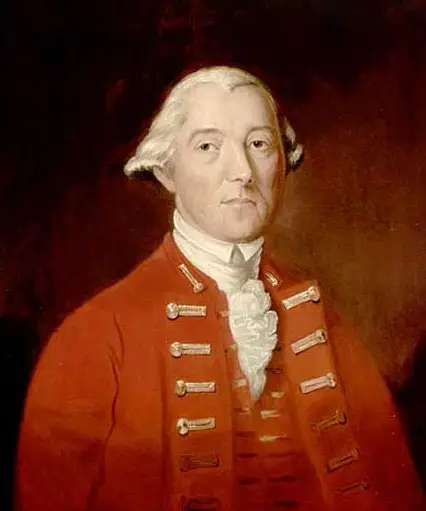
Quebec Governor Guy Carleton opposed Arnold at Quebec and Valcour Island (Wiki Image).
Benedict Arnold’s Early Contributions to the American Revolution: A Rising Star
-
Joining the Continental Army: As tensions escalated between the American colonies and Great Britain, Benedict Arnold, a successful merchant, enthusiastically joined the Continental Army in 1775. His leadership qualities, military experience from the French and Indian War, and unwavering patriotism made him a valuable asset to the fledgling American cause.
-
Capture of Fort Ticonderoga: In May 1775, Arnold was pivotal in capturing Fort Ticonderoga, a strategic British stronghold located on Lake Champlain. Collaborating with Ethan Allen and the Green Mountain Boys, a Vermont militia, Arnold’s forces successfully seized the fort and its valuable artillery, significantly boosting the Continental Army’s firepower and morale.
- Invasion of Canada: Arnold’s next major contribution was a daring and ambitious plan to invade Canada. He led a grueling expedition through the treacherous Maine wilderness, enduring harsh conditions and facing numerous obstacles. Despite reaching Quebec City in late 1775, Arnold’s forces were ultimately defeated, and he sustained a serious leg injury. Though unsuccessful, this campaign demonstrated Arnold’s determination, resourcefulness, and willingness to take risks.
- Battle of Valcour Island: In 1776, Arnold displayed his naval leadership in the Battle of Valcour Island on Lake Champlain. Despite being outnumbered and outgunned by the British fleet, Arnold’s makeshift flotilla fought valiantly, inflicting significant damage and delaying the British advance. This tactical defeat ultimately proved to be a strategic victory, as it bought valuable time for the Continental Army to regroup and prepare for the upcoming Saratoga campaign.
Benedict Arnold’s early contributions to the American Revolution made him a fearless and resourceful commander. His courage, tactical skills, and unwavering determination made him a rising star in the Continental Army. It earned him the respect of his peers and the admiration of General George Washington. However, his later actions would cast a long shadow over these early achievements, leading to his infamous betrayal and fall from grace.
Saratoga: Arnold’s leadership was pivotal in the 1777 Battles of Saratoga, contributing significantly to the American victory, often considered the war’s turning point. However, he was severely wounded in the leg during the battle.
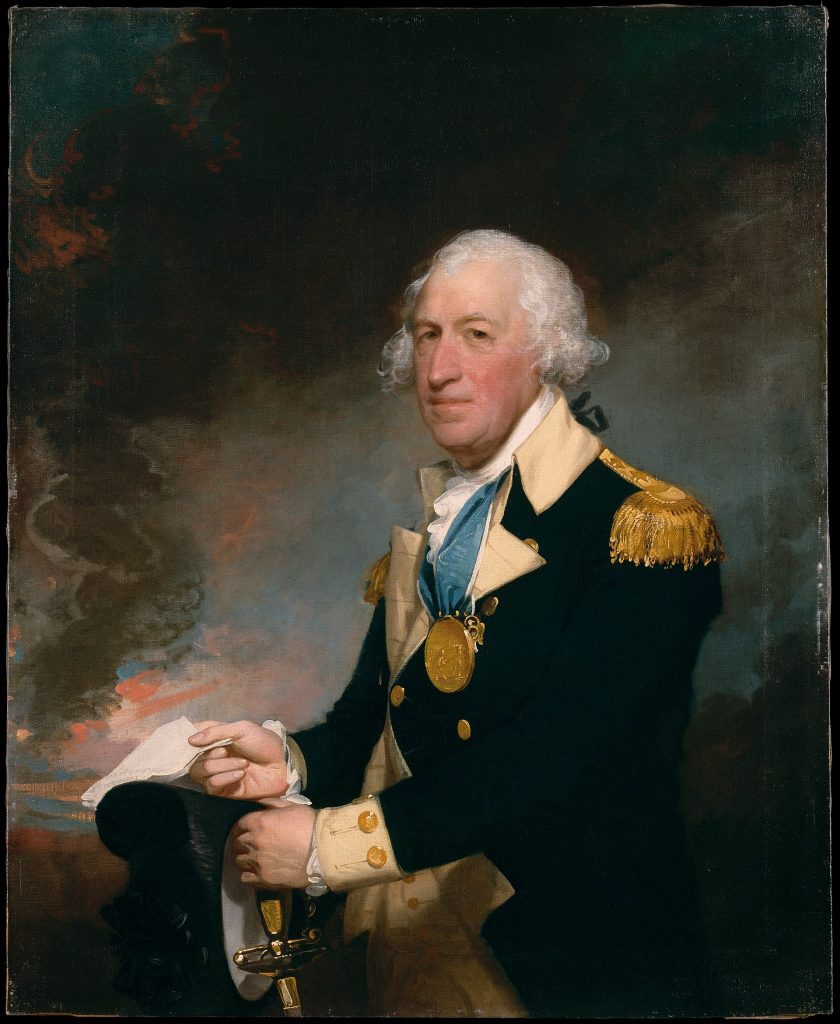
Major General Horatio Gates led the forces at Saratoga, as depicted in this portrait by Gilbert Stuart, 1793–94 (Wiki Image).
Benedict Arnold at Saratoga:
A Pivotal Victory and a Crippling Injury
The Battles of Saratoga in 1777 were a turning point in the American Revolutionary War, and Benedict Arnold’s leadership played a crucial role in the American victory. Despite being passed over for promotion and harboring resentment towards the Continental Congress, Arnold’s patriotism and military brilliance shone through in the heat of battle.
Arnold’s Contributions:
- Freeman’s Farm (September 19, 1777): Arnold, defying orders to remain in camp, rallied American troops and led a series of bold attacks against the advancing British forces. His aggressive tactics disrupted the British offensive and inflicted heavy casualties, contributing to a stalemate.
- Bemis Heights (October 7, 1777): Arnold’s leadership was even more crucial in the second battle. Ignoring a direct order from General Horatio Gates to remain in his tent, Arnold rushed into the fray, inspiring his troops and leading a decisive charge against the British fortifications. This daring maneuver broke the British lines and ultimately led to their surrender.
The Cost of Victory:
However, the victory came at a great personal cost for Arnold. During the Battle of Bemis Heights, he suffered a severe leg wound that shattered his left leg below the knee. This injury would plague him for the rest of his life, causing him constant pain and limiting his mobility.
The Turning Point:
The American victory at Saratoga was a monumental turning point in the war. It boosted American morale, demonstrated their military capabilities to the world, and most importantly, convinced France to enter the war as an American ally. French support proved crucial in the eventual American victory.
Aftermath:
Despite his heroic actions, Arnold’s relationship with the Continental Congress deteriorated. His injury left him bitter and frustrated, and he felt increasingly undervalued and mistreated. These grievances, financial difficulties, and the influence of his loyalist wife, Peggy Shippen, would eventually lead him to betrayal.
The Battle of Saratoga was a defining moment in Benedict Arnold’s career and the American Revolution. While it solidified his reputation as a military hero, it also set the stage for his tragic downfall, making it a poignant chapter in his complex and controversial legacy.
Motivations: Despite his contributions, Arnold felt unappreciated and overlooked for promotions. He also faced financial troubles and was accused of corruption. West Point: In 1780, Arnold was appointed commander of the American fortifications at West Point, New York. He secretly negotiated with the British to surrender the fort for money and a position in the British Army. Discovery: The plot was discovered when Major John André, the British officer involved in the negotiations, was captured with incriminating documents. Arnold escaped to British lines just in time to avoid arrest.

One of Arnold’s coded letters. Cipher lines by Arnold are interspersed with lines by his wife, Peggy (Wiki Image).
Benedict Arnold’s Desperate Turn: Motives, Betrayal, and Escape
Motivations for Treason:
-
Resentment and Perceived Injustice: Arnold’s valor on the battlefield was undeniable, but he felt increasingly slighted by the Continental Congress and his fellow officers. He believed he was passed over for promotions and recognition he deserved, while others with less experience were elevated. This resentment fueled his bitterness and disillusionment with the American cause.
-
Financial Troubles: Arnold had accumulated significant debts due to his lavish lifestyle and questionable business dealings. He saw the war as an opportunity to rebuild his fortune and secure a comfortable future for his family. The British offered him a substantial sum of money and a commission in the British Army, tempting him to switch sides.
-
Marriage to Peggy Shippen: Arnold’s marriage to Peggy Shippen, a young woman from a Loyalist family, further fueled his dissatisfaction with the American cause. She shared her family’s sympathies with the British and likely encouraged Arnold to explore alternatives to the revolution.
The Plot to Surrender West Point:
-
Commander of West Point: In 1780, Arnold was appointed commander of the strategic fort at West Point, New York. This position allowed him to betray the Americans by offering to surrender the fort to the British. He believed this act would solve his financial problems and secure him a prominent position in the British Army.
-
Secret Negotiations with Major John André: Arnold secretly negotiated with Major John André, a British intelligence officer, to arrange West Point’s surrender. Their clandestine meetings and coded messages were meticulously planned, but fate would intervene.
Discovery and Escape:
- André’s Capture: In September 1780, André was captured by American soldiers while returning to British lines. Incriminating documents detailing Arnold’s plans were found in his possession.
- Arnold’s Narrow Escape: Upon learning of André’s capture, Arnold narrowly escaped to the British ship Vulture, leaving his pregnant wife and infant son behind. He joined the British Army and continued to fight against his former comrades for the remainder of the war.
Benedict Arnold’s betrayal was a shocking and devastating blow to the American cause. His name became synonymous with treason, and he was forever condemned as a traitor in American history. However, the motivations behind his actions remain complex and multifaceted, revealing a man torn between loyalty and ambition, honor and greed.
British Army: Arnold served as a brigadier general in the British Army, leading raids in Virginia and Connecticut, but he never fully gained the trust of his British peers. Post-War: After the war, Arnold moved to London. He attempted various business ventures but faced financial difficulties and a lack of public trust. Death: Arnold died on June 14, 1801, in London, primarily shunned and living in relative obscurity.
Following his defection, Arnold was commissioned as a brigadier general in the British Army. He led raids in Virginia and Connecticut, aiming to disrupt American supply lines and undermine morale. However, despite his military skills, he faced suspicion and distrust from his British colleagues, who never fully accepted him due to his past betrayal.
Post-War Struggles:
After the war, Arnold and his family settled in London. He attempted various business ventures, including shipping and trade, but his reputation as a traitor hindered his success. He faced financial difficulties and social ostracism, as many in British society viewed him with contempt. His attempts to rebuild his life and reputation were met with limited success, leaving him embittered and disillusioned.
Death and Legacy:
Benedict Arnold died in London on June 14, 1801, at 60. He passed away in relative obscurity, largely shunned by British and American society. His legacy remains complex and controversial. While his early contributions to the American cause were significant, his name has become synonymous with treason and betrayal.
Arnold’s story is a cautionary tale about the dangers of unchecked ambition, the consequences of personal grievances, and the lasting impact of betrayal. It reminds us that even individuals with great talent and potential can make choices that tarnish their reputations and leave a lasting stain on history.
Infamy: Benedict Arnold’s name became synonymous with treason in the United States. He is often remembered as the quintessential traitor, with his actions serving as a cautionary tale of betrayal. Complex Figure: Despite his treason, Arnold’s early contributions to the American cause were significant, and some historians view his later actions as a tragic consequence of personal grievances and perceived injustices. Cultural Depictions: Arnold’s story has been depicted in numerous books, films, and TV shows, emphasizing both his heroism and his ultimate betrayal.
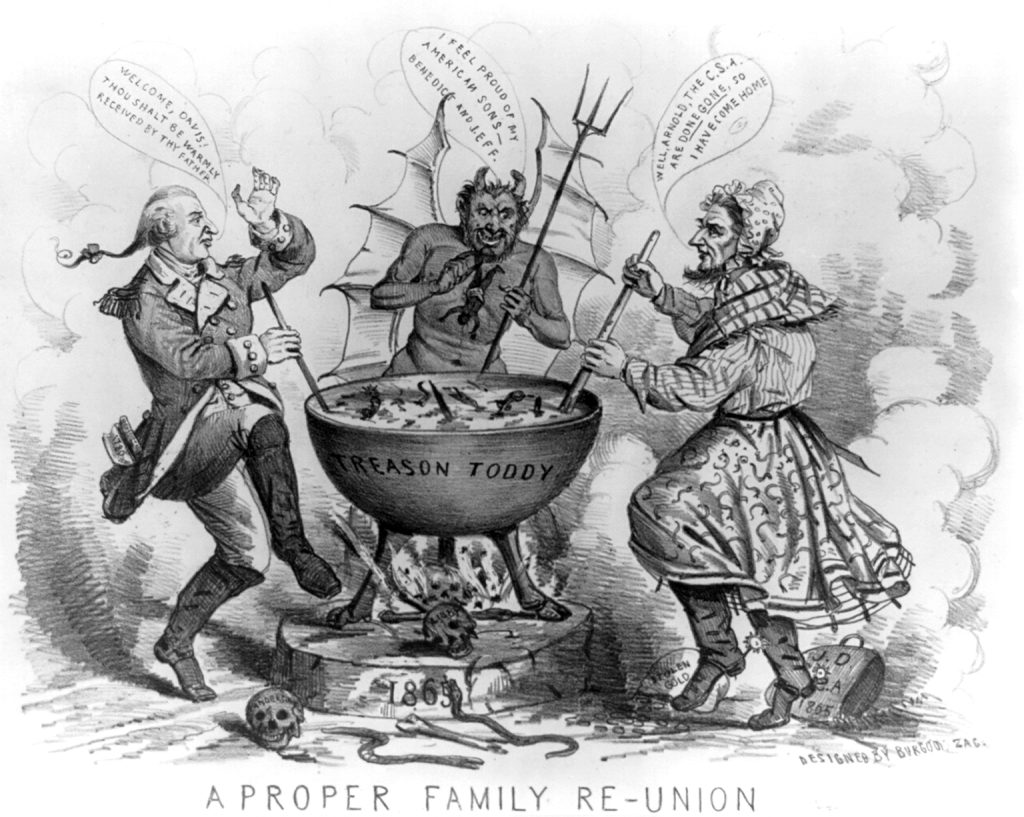
An 1865 political cartoon depicting Benedict Arnold and Jefferson Davis in hell (WIki Image).
Absolutely! You’ve captured the essence of Benedict Arnold’s complicated legacy in American history. Here’s a slightly expanded version incorporating your points:
Benedict Arnold’s Legacy: Hero and Traitor
Infamy and Treason: Benedict Arnold’s name is forever etched in American history as a synonym for betrayal. His decision to defect to the British during the Revolutionary War, offering to surrender the strategic West Point fort, solidified his reputation as the quintessential traitor. His actions are a stark reminder of the potential for even the most celebrated figures to fall from grace.
Complex Figure: Arnold’s legacy is not one-dimensional. Before his defection, he was a decorated military leader, pivotal in several key battles and campaigns that contributed to early American victories. His courage and tactical brilliance earned him the respect of his peers and the admiration of General George Washington. However, personal grievances, perceived slights, and growing disillusionment with the Continental Congress ultimately led him toward treachery.
Personal Grievances and Perceived Injustices: Some historians argue that Arnold’s actions were a tragic consequence of his perceived mistreatment by the Continental Congress and military leaders. He felt he was denied the promotions and recognition he deserved while others with less experience or merit were elevated. These grievances, financial difficulties, and the influence of his loyalist wife, Peggy Shippen, likely influenced his decision to betray the American cause.
Cultural Depictions: Benedict Arnold’s story has been fascinating and controversial for generations. His life and actions have been the subject of numerous books, films, and television shows, each offering a different interpretation of his motivations and legacy. Some portray him as a tragic figure, desperate by personal circumstances and political disillusionment. Others depict him as a villain motivated by greed and self-interest.
A Cautionary Tale: Regardless of the interpretation, Arnold’s story is a cautionary tale about the dangers of unchecked ambition, the corrosive effects of resentment and jealousy, and the fragility of loyalty in times of war. His name remains a powerful symbol of betrayal, reminding us of the human capacity for heroism and treachery.
I hope this expanded version provides a comprehensive overview of Benedict Arnold’s complex legacy. Let me know if you have any other questions!
Similarities and Differences Between Alcibiades, Guy Fawkes, and Benedict Arnold
Here’s a detailed comparison highlighting the similarities and differences between Alcibiades, Guy Fawkes, and Benedict Arnold:
Similarities
- Treason and Betrayal:
- Alcibiades: Betrayed Athens by switching allegiances to Sparta and Persia during the Peloponnesian War.
- Guy Fawkes: Attempted to betray the English government by participating in the Gunpowder Plot.
- Benedict Arnold: Betrayed the American cause by defecting to the British during the Revolutionary War.
- Political and Military Involvement:
- Alcibiades: Active in military campaigns and political maneuvers in Athens.
- Guy Fawkes: Military experience, particularly as a soldier in the Spanish army, and involvement in a politically motivated conspiracy.
- Benedict Arnold: Significant military role in the Continental Army and political implications of his defection.
- Controversial Legacies:
- Alcibiades: Viewed as a brilliant yet untrustworthy figure, both admired and reviled.
- Guy Fawkes: Remembered as a symbol of treason and resistance against tyranny.
- Benedict Arnold: Infamous in American history as a quintessential traitor.
- Cultural Depictions:
- Alcibiades: Subject of many historical and literary works, reflecting his complex legacy.
- Guy Fawkes: Icon in literature, film, and modern protest movements (e.g., Guy Fawkes mask).
- Benedict Arnold: Frequently depicted in American history as a cautionary tale of treason.
Differences
- Historical Context:
- Alcibiades: Operated during the Peloponnesian War in Ancient Greece.
- Guy Fawkes: Active in early 17th-century England during the Gunpowder Plot.
- Benedict Arnold: Involved in the American Revolutionary War in the late 18th century.
- Motivations:
- Alcibiades: Driven by personal ambition, political survival, and a desire for power.
- Guy Fawkes: Motivated by religious persecution and a desire to restore Catholicism.
- Benedict Arnold: Disillusionment with the American cause and desire for financial reward and recognition.
- Notable Actions and Outcomes:
- Alcibiades: Participated in the Sicilian Expedition, defected to Sparta and Persia, and was ultimately assassinated.
- Guy Fawkes: Attempted to blow up the House of Lords in the Gunpowder Plot and was captured and executed.
- Benedict Arnold: Planned to surrender West Point to the British; his plot was discovered, and he lived in exile in Britain.
- Impact on Society and Historical Significance:
- Alcibiades: Influenced the course of the Peloponnesian War, highlighting the complexities of loyalty and politics in Ancient Greece.
- Guy Fawkes: Inspired anti-establishment sentiments and is commemorated annually on Guy Fawkes Night.
- Benedict Arnold: His defection had a significant psychological impact on the American Revolutionary War effort and remains a potent symbol of betrayal.
- End of Life:
- Alcibiades: Assassinated in Phrygia after being exiled from Athens.
- Guy Fawkes: Executed for treason after the failure of the Gunpowder Plot.
- Benedict Arnold: Died in exile in Britain, despised by both Americans and many British.
Summary
Similarities: All three figures are known for their acts of betrayal and treason, had significant military and political roles, left controversial legacies, and are depicted in various cultural forms. Their actions were pivotal in their respective historical contexts, leading to significant consequences.
Differences: Their motivations, specific actions, historical contexts, societal impacts, and the ends of their lives differ markedly. Alcibiades was driven by personal ambition and political survival, Guy Fawkes by religious fervor, and Benedict Arnold by disillusionment and financial gain. Each operated in different periods and regions, affecting the course of their respective conflicts in unique ways.
Here’s a comparison table for Alcibiades, Guy Fawkes, and Benedict Arnold
Sure! Here is a comparison table for Alcibiades, Guy Fawkes, and Benedict Arnold, focusing on their historical significance, actions, and legacies:
| Feature | Alcibiades (c. 450-404 BC) | Guy Fawkes (1570-1606) | Benedict Arnold (1741-1801) |
| Country of Origin | Athens, Greece | England | United States (American colonies) |
| Historical Context | Peloponnesian War | Early 17th-century England | American Revolutionary War |
| Initial Allegiance | Athens | English Catholic conspirators | Continental Army (American Patriots) |
| Notable Actions | Switched allegiances between Athens, Sparta, and Persia; involved in several key military campaigns | Attempted to blow up the English Parliament (Gunpowder Plot) | Defected to the British after serving as a general in the Continental Army |
| Motivations | Personal ambition, political survival, and power | Religious persecution and the desire to restore a Catholic monarchy | Disillusionment with the American cause, financial gain |
| Major Plots/Events | Sicilian Expedition, Defection to Sparta, Return to Athens | Gunpowder Plot (1605) | Plan to surrender West Point to the British (1780) |
| Outcome | Ultimately exiled and assassinated in Phrygia | Arrested and executed for treason | Exposed as a traitor lived in exile in Britain |
| Legacy | Controversial figure, seen as both a brilliant strategist and a traitor | Symbol of treason and anti-government resistance (Guy Fawkes Night) | Infamous as a traitor in American history, a name synonymous with treachery |
| Cultural Depictions | The subject of numerous historical texts and plays, including works by Thucydides and Plutarch | Portrayed in literature, film, and as the face of modern protest (Guy Fawkes mask) | Depicted in American history books, films, and literature as a cautionary tale |
| Impact on Society | Influenced the course of the Peloponnesian War, highlighting the complexity of loyalty and politics in wartime Greece | Inspired anti-establishment sentiments; annual Guy Fawkes Night celebrations. | His defection had a significant psychological impact on the American Revolutionary War effort. |
Detailed Comparison
- Country of Origin and Historical Context:
- Alcibiades was an Athenian statesman and general during the Peloponnesian War.
- Guy Fawkes was an English soldier and member of a group of provincial English Catholics who planned the Gunpowder Plot in early 17th-century England.
- Benedict Arnold was an American military officer who initially fought for the Continental Army during the American Revolutionary War.
- Initial Allegiance and Notable Actions:
- Alcibiades initially served Athens but switched allegiances multiple times between Athens, Sparta, and Persia. His actions included participation in the Sicilian Expedition and advising Sparta on how to defeat Athens.
- Guy Fawkes joined a group of conspirators attempting to blow up the English Parliament to kill King James I and restore a Catholic monarchy. He was caught guarding the explosives.
- Benedict Arnold was a general in the Continental Army who later defected to the British Army after plotting to surrender West Point to the British.
- Motivations:
- Alcibiades was driven by personal ambition, a quest for power, and political survival.
- Guy Fawkes was motivated by religious persecution and a desire to restore Catholicism in England.
- Benedict Arnold was disillusioned with the American cause and sought financial gain and recognition from the British.
- Major Plots/Events:
- Alcibiades‘ career included the failed Sicilian Expedition, his defection to Sparta, and his eventual return to Athens before being exiled and assassinated.
- Guy Fawkes is best known for his role in the 1605 Gunpowder Plot, which sought to blow up the House of Lords.
- Benedict Arnold planned to surrender West Point to the British, but his plot was discovered, leading to his defection.
- Outcomes:
- Alcibiades was ultimately exiled and assassinated in Phrygia (modern-day Turkey).
- Guy Fawkes was arrested, tortured, and executed for treason.
- Benedict Arnold lived the rest of his life in exile in Britain, despised by Americans and many British.
- Legacy:
- Alcibiades is remembered as a brilliant yet controversial figure, admired and reviled in history.
- Guy Fawkes has become a symbol of treason and resistance against government oppression, and it is celebrated annually on Guy Fawkes Night.
- Benedict Arnold is synonymous with betrayal and treachery in American history, his name becoming a byword for traitor.
- Cultural Depictions and Impact on Society:
- Alcibiades has been the subject of numerous historical accounts and literary works, influencing views on loyalty and politics.
- Guy Fawkes is depicted in various cultural mediums, and his likeness was used in modern protest movements (e.g., the Guy Fawkes mask).
- Benedict Arnold‘s story is a cautionary tale in American culture, often depicted in educational materials and popular media. His actions had a profound psychological impact during the Revolutionary War.
These figures left a significant mark on history through their actions, often seen as traitors, but their motivations and impacts were shaped by their unique historical contexts.
Alcibiades, Guy Fawkes, and Benedict Arnold are alive today!
Sure, let’s imagine Alcibiades, Guy Fawkes, and Benedict Arnold alive today and draw comparisons based on their historical personas and possible modern-day equivalents:
Alcibiades, Guy Fawkes, and Benedict Arnold in the Modern Era
Alcibiades
Historical Context: Alcibiades was a complex figure known for his shifting allegiances and political maneuvers in Ancient Greece. His ambition and charisma allowed him to play key roles in the Peloponnesian War, frequently switching sides between Athens, Sparta, and Persia.
Modern-Day Equivalent:
- Career: Alcibiades would likely be a high-profile political figure or diplomat, possibly involved in international relations, strategic think tanks, or multinational corporations. His ability to navigate and manipulate political landscapes would suit contemporary politics or business well.
- Traits: Charismatic, ambitious, and opportunistic, he might be involved in controversial dealings or political maneuvering, maintaining influence despite frequent shifts in loyalty.
Possible Actions:
- He frequently appears in the media for his bold statements and controversial decisions.
- Involvement in multinational organizations or political think tanks, leveraging his strategic insights for global impact.
- Advocacy for ambitious international projects or reforms, navigating political landscapes with finesse.
Guy Fawkes
Historical Context: Guy Fawkes was a Catholic conspirator who attempted to blow up the English Parliament in the Gunpowder Plot of 1605, aiming to restore a Catholic monarchy in Protestant England.
Modern-Day Equivalent:
- Career: Fawkes might be involved in radical activism or part of an underground movement opposing governmental policies. He could be seen as a cyber-activist, hacker, or protest group leader.
- Traits: Driven by ideological beliefs, he would be passionate, determined, and willing to take extreme measures to achieve his goals.
Possible Actions:
- Leading or participating in high-profile protests or civil disobedience against perceived injustices.
- Utilizing modern technology to organize movements, similar to the symbolism of the Guy Fawkes mask in the Anonymous hacker group.
- Advocacy for radical political or social changes, often clashing with mainstream views and authorities.
Benedict Arnold
Historical Context: Benedict Arnold was an American military officer who defected to the British during the American Revolutionary War, driven by disillusionment and financial troubles.
Modern-Day Equivalent:
- Career: Arnold could be a military officer, intelligence agent, or corporate executive who becomes a whistleblower or defector, revealing sensitive information to rival entities or countries.
- Traits: Ambitious and initially loyal, he would become disillusioned with his cause or organization, leading to his betrayal for personal or financial reasons.
Possible Actions:
- Exposing confidential information or engaging in corporate espionage, possibly revealing government or corporate secrets to competitors.
- He publicly criticizes former affiliations and justifies his defection based on perceived injustices or corruption.
- I was living in a self-imposed exile, possibly facing legal actions or public backlash while maintaining a complex legacy of both condemnation and intrigue.
Summary:
If alive today, Alcibiades might be a high-profile political figure adept at maneuvering through complex international relations, Guy Fawkes could be a radical activist using modern technology to fight against government oppression, and Benedict Arnold might be a controversial whistleblower or defector revealing critical information. Their historical actions and motivations would find new forms in the contemporary world, continuing to challenge the status quo and leaving a lasting impact on society.



